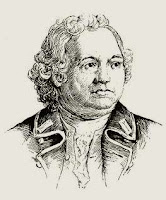 The provincial plan for the Battle of Bunker Hill called for Capt. Samuel Gridley and Capt. John Callender to take their artillery companies, each with two four-pounder cannon, into the redoubt that infantrymen had built on Breed’s Hill. Gridley was a New Hampshire blacksmith and nephew of the artillery regiment’s commander. Callender was a Boston mechanic trained in that town’s militia artillery company.
The provincial plan for the Battle of Bunker Hill called for Capt. Samuel Gridley and Capt. John Callender to take their artillery companies, each with two four-pounder cannon, into the redoubt that infantrymen had built on Breed’s Hill. Gridley was a New Hampshire blacksmith and nephew of the artillery regiment’s commander. Callender was a Boston mechanic trained in that town’s militia artillery company. In a letter to his mother, a private named Peter Brown described what he saw one of those artillery captains do:
Our Officers sent time after time for Cannon from Cambridge in the Morning & could get but four, the Captn of which fir’d a few times then swung his Hat three times round to the enemy and ceas’d to fireOne problem was that the American guns weren’t powerful enough to answer the Royal Artillery‘s fire from Copp’s Hill in Boston. Another was a problem with supplies: as a committee from the Massachusetts Provincial Congress found a week later:
An officer of rank affirmed to your Committee that he absolutely knew that some of the [gunpowder] cartridges and balls were too large for the cannon, and that it was necessary to break the cartridges before they could be of use.That committee was formed to investigate “a report which has prevailed in the Army, that there has been treachery in some of the Officers.” The legislators interviewed American commanders and reported back:
General [Israel] Putnam informed us, that in the late action, as he was riding up Bunker’s Hill, he met an officer of the Train drawing his cannon down in great haste; he ordered the officer to stop and go back; he replied he had no cartridges; the General dismounted and examined his boxes, and found a considerable number of cartridges, upon which he ordered him back; he refused, until the General threatened him with immediate death, upon which he returned up the hill again, but soon deserted his post and left the cannon.In his History of Bunker Hill Battle (1827), Samuel Swett cited a letter from Putnam’s son to say that in his encounter with the retreating artillery company the Connecticut general had ”entreated, threatened, and broke his sword over them knocking down a non-commissioned officer.”
Another officer, who had the direction of another cannon, conducted much in the same manner. The relation of this matter from General Putnam was confirmed by several other officers of distinction, as to what is most material relative thereto. . . .
General Putnam declared to your Committee, as his opinion, that the defeat of that day was owing to the ill-behaviour of those that conducted the artillery, and that, one of these officers ought to be punished with death, and that unless some exemplary punishment was inflicted, he would assuredly leave the Army. That upon the defeat of the officers of the Train, the re-enforcements ordered up the hill could not be prevailed upon to go; the plea was, the Artillery was gone, and they stood no chance for their lives in such circumstances…
But one thing Putnam hadn’t done was get the name of the artillery officer he met. (This story and the consequences of it will be part of my free talk at the Society of Cincinnati museum in Washington, D.C., on 10 July.)
TOMORROW: Capt. Samuel Trevett of Marblehead.
For those of us that didn't get to see your talk, can you tell us whether there is any truth to the story that Old Put "entreated, threatened, and broke his sword over them knocking down a non-commissioned officer."?
ReplyDeleteI have decided to continue this thread on your other related post.
ReplyDeleteI'm glad you found that other post mentioning Putnam's sword. I tried to link to it yesterday, but was out of the office and couldn't get my equipment to cooperate.
ReplyDelete